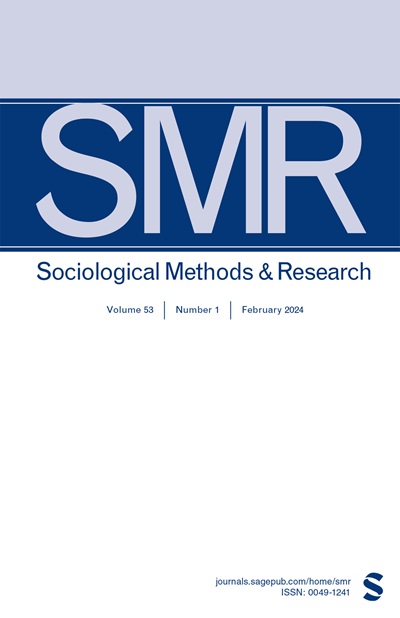Comparing Single- and Multiple-Question Designs of Measuring Family Income in China Family Panel Studies
IF 6.5
2区 社会学
Q1 SOCIAL SCIENCES, MATHEMATICAL METHODS
引用次数: 0
Abstract
Family income questions in general purpose surveys are usually collected with either a single-question summary design or a multiple-question disaggregation design. It is unclear how estimates from the two approaches agree with each other. The current paper takes advantage of a large-scale survey that has collected family income with both methods. With data from 14,222 urban and rural families in the 2018 wave of the nationally representative China Family Panel Studies, we compare the two estimates, and further evaluate factors that might contribute to the discrepancy. We find that the two estimates are loosely matched in only a third of all families, and most of the matched families have a simple income structure. Although the mean of the multiple-question estimate is larger than that of the single-question estimate, the pattern is not monotonic. At lower percentiles up till the median, the single-question estimate is larger, whereas the multiple-question estimate is larger at higher percentiles. Larger family sizes and more income sources contribute to higher likelihood of inconsistent estimates from the two designs. Families with wage income as the main income source have the highest likelihood of giving consistent estimates compared with all other families. In contrast, families with agricultural income or property income as the main source tend to have very high probability of larger single-question estimates. Omission of certain income components and rounding can explain over half of the inconsistencies with higher multiple-question estimates and a quarter of the inconsistencies with higher single-question estimates.中国家庭面板研究中衡量家庭收入的单题与多题设计比较
一般目的调查中的家庭收入问题通常采用单题摘要设计或多题分类设计。目前尚不清楚这两种方法的估计如何相互一致。本文利用了一项大规模的调查,用这两种方法收集了家庭收入。利用2018年具有全国代表性的中国家庭面板研究(China Family Panel Studies)中来自14222个城乡家庭的数据,我们比较了这两种估计,并进一步评估了可能导致差异的因素。我们发现,只有三分之一的家庭的两种估计是松散匹配的,而大多数匹配的家庭的收入结构都很简单。虽然多题估计的平均值大于单题估计的平均值,但其模式并非单调的。从较低的百分位数到中位数,单题估计值更大,而在较高的百分位数,多题估计值更大。较大的家庭规模和更多的收入来源导致两种设计的估计不一致的可能性更高。与所有其他家庭相比,以工资收入为主要收入来源的家庭给出一致估计的可能性最高。相比之下,以农业收入或财产性收入为主要来源的家庭往往有很高的概率得到更大的单题估计。某些收入成分的遗漏和四舍五入可以解释超过一半的与较高的多题估计不一致和四分之一的与较高的单题估计不一致。
本文章由计算机程序翻译,如有差异,请以英文原文为准。
求助全文
约1分钟内获得全文
求助全文
来源期刊

Sociological Methods & Research
Multiple-
CiteScore
16.30
自引率
3.20%
发文量
40
期刊介绍:
Sociological Methods & Research is a quarterly journal devoted to sociology as a cumulative empirical science. The objectives of SMR are multiple, but emphasis is placed on articles that advance the understanding of the field through systematic presentations that clarify methodological problems and assist in ordering the known facts in an area. Review articles will be published, particularly those that emphasize a critical analysis of the status of the arts, but original presentations that are broadly based and provide new research will also be published. Intrinsically, SMR is viewed as substantive journal but one that is highly focused on the assessment of the scientific status of sociology. The scope is broad and flexible, and authors are invited to correspond with the editors about the appropriateness of their articles.
 求助内容:
求助内容: 应助结果提醒方式:
应助结果提醒方式:


